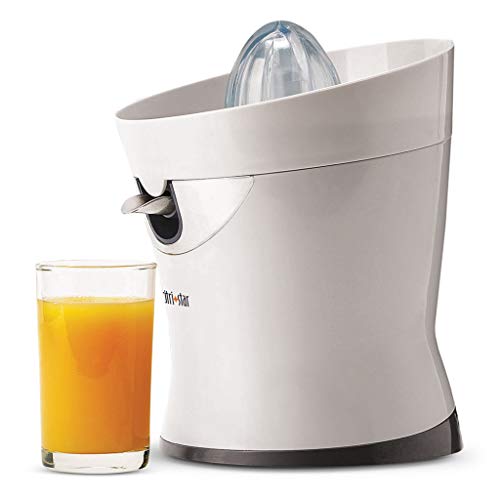How to Choose the Citrus Juicers
Citrus Juicers: The Perfect Tool for Fresh and Healthy Juice

- 1. Citrus Juicers: The Perfect Tool for Fresh and Healthy Juice
- 2. How to Choose a Citrus Juicer
- 2.1. Motor Power
- 2.2. Pulp Control
- 2.3. Ease of Use and Juicing Time
- 2.4. Taste and Cleanliness
- 2.5. Ease of Cleaning
- 2.6. Spout Size and Space
- 2.7. Budget
- 3. Usage Tips and Tricks
- 3.1. Juice Quantity per Fruit
- 3.2. Avoid the Pith
- 3.3. Maximizing Juice Yields
- 3.4. Consider the Acidity
When it comes to relishing a revitalizing glass of juice, there's nothing quite like the flavor and nutritional advantages offered by freshly squeezed citrus fruits. Citrus juicers serve as the perfect kitchen tool for extracting the utmost juice from oranges, lemons, limes, and grapefruits. These convenient gadgets not only simplify the juicing procedure but also guarantee that you receive the greatest yield from your citrus fruits, both in terms of taste and wellness advantages.
Why Choose a Citrus Juicer?
- Efficiency: Citrus juicers are highly efficient in extracting juice from citrus fruits due to their specialized design. They feature a cone-shaped reamer that snugly fits the fruit, ensuring every last drop of juice is extracted, which minimizes waste.
- Ease of Use: In contrast to more complex juicers with numerous components, citrus juicers are user-friendly and straightforward. Simply cut the fruit in half, place it on the reamer, and apply pressure. The juicer effortlessly takes care of the rest, extracting the juice while leaving behind seeds and pulp.
- Versatility: Citrus juicers come in various sizes and capacities to cater to diverse needs. Whether you're looking to make a single glass of juice or a large batch for the entire family, there's a citrus juicer to meet your requirements. Some models even offer interchangeable reamers to accommodate different citrus fruit sizes.
- Nutritional Value: Freshly squeezed citrus juice is rich in essential vitamins, minerals, and antioxidants. By using a citrus juicer, you can maximize the nutritional value of your fruits. The juice is extracted rapidly, minimizing exposure to air and preserving the nutrients.
- Flavor: The taste of freshly squeezed citrus juice is unmatched. It showcases the natural sweetness and tanginess of the fruits, delivering a burst of flavor that cannot be replicated by store-bought juices. With a citrus juicer, you can savor the pure, unadulterated essence of your favorite citrus fruits.
Types of Citrus Juicers
Citrus juicers come in two main types: manual and electric.
- Manual Citrus Juicers: These juicers rely on manual operation, making them a great choice for those who prefer a more traditional approach to juicing. They are compact, easy to clean, and do not require electricity. Manual citrus juicers are ideal for occasional juicing or for individuals with limited counter space.
- Electric Citrus Juicers: Powered by electricity, electric juicers offer a convenient and efficient juicing experience. They come equipped with a motor that rapidly spins the reamer, significantly speeding up the juicing process. Electric citrus juicers are well-suited for regular juicing and for those who value saving time and effort in their juicing routine.
How to Choose a Citrus Juicer
The choice of the perfect citrus juicer for your home depends on several factors. While citrus juicers are generally simpler than those designed for other fruits and vegetables, it's essential to be informed before making a purchase. Let's explore some key factors to consider when making your decision.
Motor Power
When selecting a citrus juicer with a motor, evaluate the motor's power, its juice production capacity, and its ease of use with oranges, lemons, and limes. A powerful motor tends to be noisier but offers a quicker and more efficient juicing process. Cold-press juicers, on the other hand, are quieter but require more time. If you intend to juice larger quantities, opt for a juicer with a stronger motor, though this might result in higher noise levels.
Pulp Control
Preferences for pulp content in juice vary among individuals. Choosing a machine with an adjustable strainer allows everyone to enjoy their preferred level of pulp. Some people appreciate pulp in their citrus juice, while others prefer it without. Unlike other juice types, pulp can enhance the flavor of citrus juice for many. Having an adjustable strainer ensures a customized juicing experience, as the pulp amount varies depending on the fruit you're using. Larger fruits yield more juice with a lower percentage of pulp. A good citrus juicer can handle various fruits, not just oranges.
Ease of Use and Juicing Time
Different juicers vary in efficiency, with some taking longer to produce juice. Some juicers may also get clogged with pulp, causing delays. If you prefer quick, homemade juice in the mornings, consider the time it takes to juice. Having a convenient juicer in your kitchen is ideal if you have citrus plants in your yard. Choose a machine that aligns with your time constraints, whether you're juicing oranges, lemons, limes, or a combination of these.
Taste and Cleanliness
A quality juicer should extract juice deeply from the fruit without reaching the pith, as this can affect the taste. Clean rinds and minimal leftover pulp indicate an efficient juicer. Ensure your fruit is properly prepared before juicing, as even the best machine can't compensate for poor-quality fruit or inadequate preparation.
Ease of Cleaning
Numerous citrus juicers are designed to be compatible with dishwashers, streamlining the cleaning procedure. Nevertheless, intricate juicers could prove to be troublesome when it comes to taking them apart and putting them back together, even if their components can be safely cleaned in a dishwasher. Certain electric juicers come with dishwasher-safe parts, further enhancing the convenience of cleaning, provided you have enough room in your dishwasher.
Spout Size and Space
Often overlooked, spout size can significantly affect the messiness of the juicing process. A larger spout reduces spills. Additionally, a juicer with a larger cone accommodates various fruit sizes, increasing its versatility. Consider the available space, as it directly impacts the juicer's yield.
Budget
Before narrowing down your options, establish a budget. The most significant and user-friendly electric juicers tend to be pricier but are suitable for large families or frequent juicer users. Smaller or manual juicers are great for smaller households or infrequent use. Commercial citrus juice machines come at a higher price point but are excellent for those aiming to produce larger quantities of juice.
Usage Tips and Tricks
Fresh citrus juice is among the finest beverages, and you can easily prepare it in the comfort of your own home. Just like with most recipes or kitchen tools, there are plenty of tips available to simplify your life.
Juice Quantity per Fruit
Citrus fruits exhibit diverse juice yields, influenced by factors like their size, cultivation environment, and the overall health of the tree. Nonetheless, here's an estimated juice volume you can anticipate from each of the following fruits:
- Lime: 0.5 to 1 ounce
- Lemon: 1.75 ounces
- Grapefruit: 5 to 6 ounces
- Orange: 2 to 3 ounces
Avoid the Pith
The pith, the white section between the fruit and the skin, can significantly affect the amount of juice you extract. While citrus juicers can help maximize your juice yield, it's essential to start with good-quality fruit. This is especially crucial when using an electric juice machine to prevent bitter juice. Avoid over-reaming the fruit, as it may puncture the pith.
Maximizing Juice Yields
If you're investing time, effort, and money into making your own juice, it's logical to want to get the most juice possible. One effective method is to roll the fruit firmly under your palm before juicing. This action loosens the fruit's insides, making it easier to extract the juices. If you're using an electric juice machine, this rolling motion can release natural oils and fragrances from the rind that might otherwise remain trapped. Another way to increase juice yields is to warm the fruit slightly. If your fruit is refrigerated, remove it about thirty minutes before juicing. For a quicker option, microwave the fruit for approximately ten seconds.
Consider the Acidity
Citrus fruits possess a notable level of acidity, which can give rise to several potential concerns. It is advisable to wash your hands diligently after juicing and exercise caution when handling citrus fruits to avoid contact with your face or eyes, as the acidity can induce irritation, particularly if you have open cuts or dry skin. To safeguard your tooth enamel from acid-related damage, make sure to brush your teeth after consuming citrus fruit juice. Additionally, when citrus juice comes into contact with your skin in direct sunlight, it can heighten the risk of sunburn.
In summary, acquiring a citrus juicer offers an excellent opportunity to relish the pleasures of freshly squeezed citrus juice right in the comfort of your home. Irrespective of your preference for citrus fruits, whether it's oranges, lemons, limes, or grapefruits, a citrus juicer ensures optimal flavor and nutrition extraction. Thanks to their efficiency, user-friendly design, and versatility, citrus juicers are an essential addition to any aficionado of juicing. So, seize your favorite citrus fruits and embark on a journey toward a healthier lifestyle through the joy of juicing!










